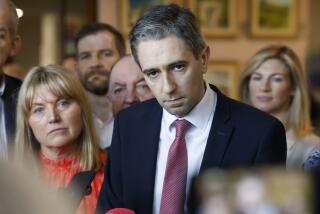N. Irish Nobelist Quits as Head of Party
- Share via
BELFAST, Northern Ireland — Nobel Peace Prize winner David Trimble, who helped engineer Northern Ireland’s historic Good Friday agreement, resigned as the leader of his moderate Protestant party Saturday after its humiliating defeat in British parliamentary elections.
Trimble’s Ulster Unionist Party was swept from nearly all its seats by pro-Britain voters frustrated with the Irish Republican Army and the failed 1998 power-sharing agreement.
Only one Ulster Unionist survived the tumultuous election as Protestant voters shifted to the hard-line Democratic Unionist Party.
Trimble, speaking on BBC Radio, blamed his downfall on the IRA and its political ally, Sinn Fein, accusing them of ignoring the agreement that was meant to lead to the disarming of the militia that has fought British rule in the province.
“Rather than implement the agreement, the republican movement have exploited the agreement,” Trimble said.
“The net result of all of that,” he added, “is that there is total disgust in the unionist community with them.”
Trimble led the Ulster Unionists through a transformative decade that began with the party holding 10 seats in Parliament and peaked with Trimble as first minister of Northern Ireland, before the Good Friday agreement collapsed in 2002 over alleged IRA actions.
A spate of scandals before the election inflamed Protestant-Catholic tensions, including a $50-million bank raid and the slaying of a Belfast Catholic, both linked to the IRA. Democratic Unionists, who opposed the power-sharing agreement, accused Trimble of being too lenient with Sinn Fein and the IRA.
Critics in his own party griped that Trimble, a former law professor, was too elitist and authoritarian.
Trimble was wounded by the lack of support from the governments in Britain and the Irish republic as well as from Sinn Fein, said Paul Dixon, a University of Ulster professor of politics.
“Rather than shoring up his position, the British and Irish governments just pushed and pushed him,” Dixon said.
“He was stretching to make the agreement work, and they might have put more pressure on the republicans to deliver. Every time he jumped, they didn’t.”
But Danny Morrison, a commentator and former Sinn Fein spokesman, said Trimble’s political problem was not the IRA, but the bare majority of British unionists who supported the Good Friday agreement.
“He was always undermined in his own community,” Morrison said.
With Democratic Unionists winning nine seats and Sinn Fein increasing its tally to five, some observers said they feared that Northern Ireland’s peace process would deadlock.
The Rev. Ian Paisley, the Democratic Unionist leader, has vowed not to negotiate with Sinn Fein, which he says supports terrorists.
Paisley also offered no olive branch to his departing rival. “David Trimble took the wrong road,” he told the British Broadcasting Corp.
Billy Armstrong, an Ulster Unionist politician, said the voters unfairly punished the Nobel laureate.
“David Trimble saw the way forward for Northern Ireland, but the people of Northern Ireland were not ready for him,” he said. “He was a bit before his time. People needed more time to get accustomed to this way of life.”
More to Read
Sign up for Essential California
The most important California stories and recommendations in your inbox every morning.
You may occasionally receive promotional content from the Los Angeles Times.













